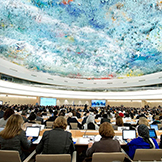Human Rights Council 35th session (6-23 June 2017)
Panel Discussion on Women’s Rights and the 2030 Agenda for Sustainable Development: Health and Gender Equality
Statement by Ireland
13 June 2017
Mr. President,
Ireland warmly welcomes this opportunity to take part in this interesting discussion on health and gender equality in relation to women’s rights and the 2030 Agenda.
The intersection between health and gender equality represents a significant opportunities to operationalize the Sustainable Development Goals in compliance with human rights obligations. There is a lot to be done. A greater focus is needed on the critical importance of exposing how gender relations and other patterns of inequality could influence our ability to contribute to the achievement of not only Goals 3 and 5, but all the global goals.
Addressing inequality, gender based violence and improving access to maternal and reproductive health care are longstanding priorities for Ireland’s Overseas Development programme.
We consider that inequality is driven not only by poverty, but by social exclusion, discrimination, gender norms and the neglect of basic human rights, including sexual and reproductive health and rights. Too often, stigma and discrimination act as a barrier in the provision of quality and accessible information and services, especially for key populations including young women and adolescent girls.
Ireland has supported global and national efforts to reduce inequalities in access to health services. These efforts have contributed to significant advances. For example, in Ethiopia the Under 5 mortality rate dropped from 205 to 59 per 1000 live births in 2015 according to WHO. Our partnership with the Ministry of Health and other likeminded stakeholders in Ethiopia has contributed to this decrease.
However many challenges remain. Despite progress in reducing global maternal mortality by 44%, developing countries still account for 99% of all maternal deaths. New HIV infections have dropped from 3.1 million to 2 million annually in the past 15 years, although worryingly new infections among adolescents and young people are increasing, with girls particularly vulnerable. Violence against women continues to present a significant public health problem as well as a violation of women’s human rights.
In this regard, participation is a key consideration - by taking a more active role in decision-making pertaining to health services, women can shape a health system that is more responsive to their priorities and concerns. We would welcome further elaboration of their views by the panel of the implications and opportunities for partnership with women and women’s organisations at a grassroots level in efforts to achieve the SDGs.
We are also particularly interested in preventable maternal mortality and morbidity; and the related issue of preventable mortality and morbidity of children under 5 years of age. We are convinced of the value of a human rights based approach in both cases; and would be interested to hear views of the panellists on opportunities to further advance practical implementation of the Technical Guidance on these issues previously endorsed by the Council.
Thank you

